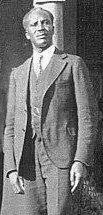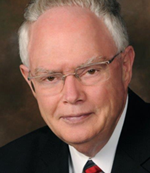 K.E.M. Spooner
K.E.M. Spooner With this snapshot, I give thanks to our Lord at this Thanksgiving season for the people who blazed the trail and wrote the worldwide history of IPHC, obeying our Lord’s Great Commission. This winsome story makes the point. It is a glimpse into the life of a little known missionary pioneer. I have cited and adapted it from The Simultaneous Principle, a History of World Missions Ministries, from the life story of D. D. Freeman, and from South Africa’s Rustenburg Herald newspaper. - Frank Tunstall
In a small room in a suburb in New York City in 1906, God spoke to the Rev. Mr. Kenneth E. M. Spooner while he was on his knees praying, and told him to go to Africa. Being much disturbed by this call, he joined the British Navy in an effort to avoid the commission.
Spooner’s “running-from-God years” continued after his stint in the Royal Navy. During this time he took a job as a cook on a ship that pulled out of port in Central America. One day while up on deck, he saw two sisters reading their Bibles. He said his heart was particularly drawn toward Malista, the younger sister. Before the voyage was completed, he asked Malista’s older sister if she would be willing to give her sister to him in marriage.
“I asked Mrs. Spooner,” wrote D. D. Freeman, “why her husband chose her instead of her older sister. Her only reply was a loud laugh!"
Eight years passed before Spooner’s vision began to blossom.
On a bitter-cold day in December 1914, in a small New York hotel, the Spooners’ were praying--a man and his wife to whom God had given a burning assignment to Africa. Their petition was that the Lord would in some way supply funds sufficient for them to board a ship to South Africa. At that time, a steamship was in harbor headed to Cape Town. It was scheduled to leave in two days.
Sitting at the table for breakfast that morning Spooner shared his desire to preach in Africa. A lady who was a stranger passed a gift to him under the table. It was enough money to buy tickets for him and his wife to South Africa. Without delay, they paid their fares and sailed for England. After getting their passports in order, they boarded a ship to South Africa. Spooner had no on-going support base to underwrite their livelihood and no hope of tickets to return home.
They had joined the earliest wave of Pentecostals who obeyed God as missionaries with only one-way tickets.
[World War I was raging at the time. The United States entered the war in April 1917, ultimately adding two million men to the fight].
When the Spooners arrived in South Africa, they were admitted into the country on a clerical error. South African law said the black population of the country could not be increased from “outside” South Africa. The truth dawned on Spooner later that the customs official in the Port of Capetown approved their entry by mistake!
Spooner began his ministry with a tribe called the Phokeng, near Rustenburg. [The area is in the Northwest Province of South Africa and is noted for agriculture and mining, particularly platinum.]
The Spooners’ were soon loved in the village, and his reputation continued to grow. One government official wrote he was “by far the best and most capable of any black ministers in the district,” and spoke of him as “a well-dressed, respectable and respectful man.”
Soon Spooner began preaching on beer, polygamy and other sins. Then the persecution started.
One morning as he entered the church, he found some of his natives crying. They took him to a corner of the building where a hole had been dug during the night. In this small pit was a piece of decayed pork placed there by the witch doctors. The natives explained to him that he would become as that pork in a few days.
Rev. Spooner sent for the witch doctor. He showed him the meat and said, “You meant this for me?”
“Yes, you’ve been preaching against beer, having many wives and other things. Now you will soon be as this meat.”
Spooner pointed at the meat and then to the witch doctor, and said, “In the name of Jesus Christ this is not for me but for you!”
The witch doctor went to his room, laid down on his mat, and in three days was dead. The news spread that Rev. Spooner was the stronger doctor!
Because of the Spooners’ labors, the Mission Station at Phokeng became a successful ministry, including a quality school that he launched. Spooner required all of his students to learn English, and the community was so impressed with the school the enrollment flourished.
The General Missions Board, (today the IPHC World Missions Board), accepted Spooner as a Pentecostal Holiness missionary in 1922, making him the first black missionary in the history of IPHC.
“Although he received less than any of us in worldly goods,” wrote D. D. Freeman, “he drove the best car, had the finest furniture and dressed better than any of the missionaries. When he felt he was called to do things in the will of God, he moved and never faltered.”
Reverend Kenneth Spooner went on to his reward in 1937 in the Rustenberg General Hospital, after undergoing an operation. According to the Rustenburg Herald, his funeral was attended by some 2,500 natives and another 100 Europeans from Rustenburg, Johannesburg and Pretoria. The Herald also noted that Joel Rhodes, Pentecostal Holiness National Superintendent, officiated at the funeral.
The last words Spooner spoke on this earth were, “Do not let God’s work die.”
Kenneth Spooner served the Lord faithfully in Africa for twenty-two years. He was survived by his beloved Malista and one adopted daughter, Wilhemina.
In a small room in a suburb in New York City in 1906, God spoke to the Rev. Mr. Kenneth E. M. Spooner while he was on his knees praying, and told him to go to Africa. Being much disturbed by this call, he joined the British Navy in an effort to avoid the commission.
Spooner’s “running-from-God years” continued after his stint in the Royal Navy. During this time he took a job as a cook on a ship that pulled out of port in Central America. One day while up on deck, he saw two sisters reading their Bibles. He said his heart was particularly drawn toward Malista, the younger sister. Before the voyage was completed, he asked Malista’s older sister if she would be willing to give her sister to him in marriage.
“I asked Mrs. Spooner,” wrote D. D. Freeman, “why her husband chose her instead of her older sister. Her only reply was a loud laugh!"
Eight years passed before Spooner’s vision began to blossom.
On a bitter-cold day in December 1914, in a small New York hotel, the Spooners’ were praying--a man and his wife to whom God had given a burning assignment to Africa. Their petition was that the Lord would in some way supply funds sufficient for them to board a ship to South Africa. At that time, a steamship was in harbor headed to Cape Town. It was scheduled to leave in two days.
Sitting at the table for breakfast that morning Spooner shared his desire to preach in Africa. A lady who was a stranger passed a gift to him under the table. It was enough money to buy tickets for him and his wife to South Africa. Without delay, they paid their fares and sailed for England. After getting their passports in order, they boarded a ship to South Africa. Spooner had no on-going support base to underwrite their livelihood and no hope of tickets to return home.
They had joined the earliest wave of Pentecostals who obeyed God as missionaries with only one-way tickets.
[World War I was raging at the time. The United States entered the war in April 1917, ultimately adding two million men to the fight].
When the Spooners arrived in South Africa, they were admitted into the country on a clerical error. South African law said the black population of the country could not be increased from “outside” South Africa. The truth dawned on Spooner later that the customs official in the Port of Capetown approved their entry by mistake!
Spooner began his ministry with a tribe called the Phokeng, near Rustenburg. [The area is in the Northwest Province of South Africa and is noted for agriculture and mining, particularly platinum.]
The Spooners’ were soon loved in the village, and his reputation continued to grow. One government official wrote he was “by far the best and most capable of any black ministers in the district,” and spoke of him as “a well-dressed, respectable and respectful man.”
Soon Spooner began preaching on beer, polygamy and other sins. Then the persecution started.
One morning as he entered the church, he found some of his natives crying. They took him to a corner of the building where a hole had been dug during the night. In this small pit was a piece of decayed pork placed there by the witch doctors. The natives explained to him that he would become as that pork in a few days.
Rev. Spooner sent for the witch doctor. He showed him the meat and said, “You meant this for me?”
“Yes, you’ve been preaching against beer, having many wives and other things. Now you will soon be as this meat.”
Spooner pointed at the meat and then to the witch doctor, and said, “In the name of Jesus Christ this is not for me but for you!”
The witch doctor went to his room, laid down on his mat, and in three days was dead. The news spread that Rev. Spooner was the stronger doctor!
Because of the Spooners’ labors, the Mission Station at Phokeng became a successful ministry, including a quality school that he launched. Spooner required all of his students to learn English, and the community was so impressed with the school the enrollment flourished.
The General Missions Board, (today the IPHC World Missions Board), accepted Spooner as a Pentecostal Holiness missionary in 1922, making him the first black missionary in the history of IPHC.
“Although he received less than any of us in worldly goods,” wrote D. D. Freeman, “he drove the best car, had the finest furniture and dressed better than any of the missionaries. When he felt he was called to do things in the will of God, he moved and never faltered.”
Reverend Kenneth Spooner went on to his reward in 1937 in the Rustenberg General Hospital, after undergoing an operation. According to the Rustenburg Herald, his funeral was attended by some 2,500 natives and another 100 Europeans from Rustenburg, Johannesburg and Pretoria. The Herald also noted that Joel Rhodes, Pentecostal Holiness National Superintendent, officiated at the funeral.
The last words Spooner spoke on this earth were, “Do not let God’s work die.”
Kenneth Spooner served the Lord faithfully in Africa for twenty-two years. He was survived by his beloved Malista and one adopted daughter, Wilhemina.
